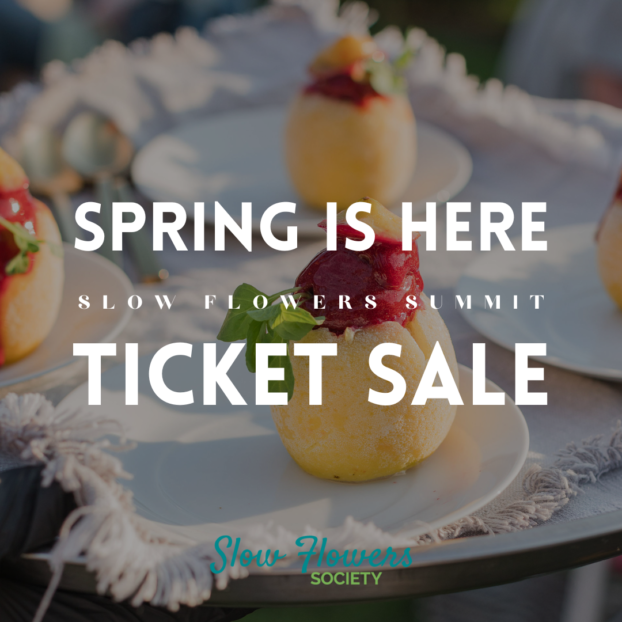Podcast: Play in new window | Download
Subscribe: Apple Podcasts | Podcast Index | RSS | More
More Slow Flowers members are exploring native plants as potential floral design elements – both on their farms and in their studios. In fact, in our recent survey, 87 percent of members say they grow native plant species as part of their crop mix! Today, you’ll hear the inspiring Native Flora conversation recorded during our March Slow Flowers member meet-up, as three creatives share their insights and advice for adding more native plants to your floral business.
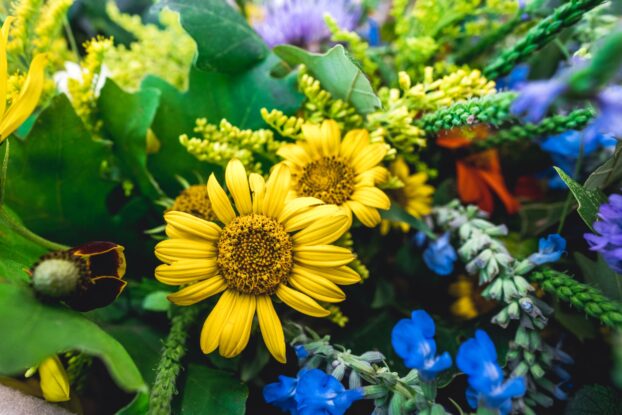
There’s an emerging a mindset that individual actions, while small, can be part of our cumulative efforts to address climate change. While the horticulture and landscape professions in North America have long been tuned into the importance of preserving native plant species, that awareness has not been present in flower farming and floral design circles until recently.
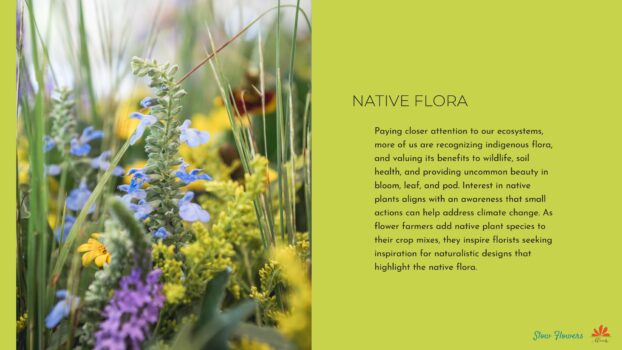
We’ve been tracking the embrace of native flora for some time here at the Slow Flowers Movement. In the 2023 Slow Flowers Floral Insights & Industry Forecast, we noted the work of flower farmer Alexandra Cacciari of Ann Arbor-based Seeley Farm to evaluate native perennials as cut flowers and later hosted Alex on Episode 598 to discuss her research exploring native plants as potential floral design elements.
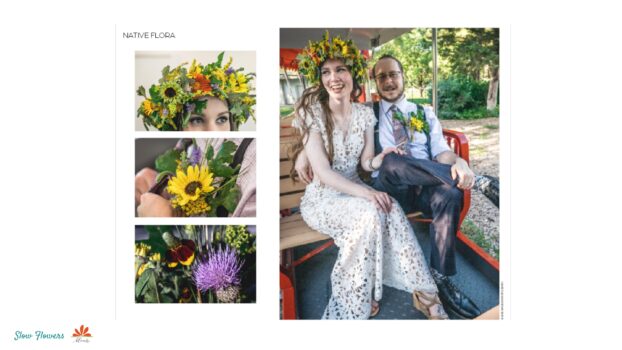
Design: District 2 Floral Studio
In our 2024 Slow Flowers Floral Insights & Industry Forecast, we devoted the first insight to ‘Native Flora,’ with contributions from Holly and Deborah. There are long-term benefits of championing native plants, and that conversation continued during the March 8th virtual member meet-up, the recording of which you’ll hear today. I’m delighted to share this episode with you and many thanks to our three panelists, Native Flora for Farmers and Florists with Holly Lukasiewicz of District 2 Floral Studio; Deborah Majerus of Iron Butterfly Farm and Lodging; and Kate Watters of Wild Heart Farm.
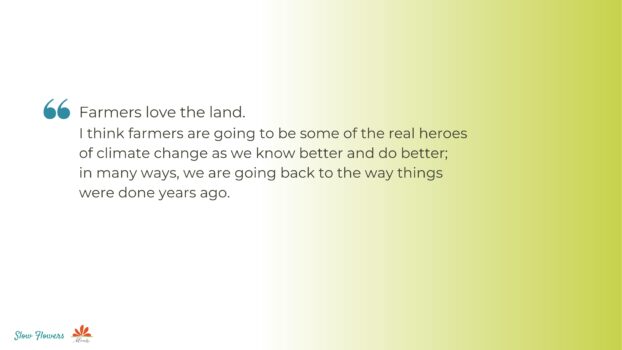
Here’s a bit more about our guests:
Holly has a background in design, creative projects and community art and through her Omaha-based District 2 Floral Studio she serves Nebraska and Iowa with floral design rooted in sustainability and Slow Flowering practices, offering event work, installations, workshops, daily deliveries, New Moon monthly flower subscriptions, Celebration of Life pieces, custom flower preservation, along with home & corporate account design services.
Deborah is the owner of Iron Butterfly Farm and Lodging in Rochester, Minnesota, an urban flower farm that uses sustainable and regenerative practices, grows a permaculture mini food forest, peonies, woody ornamental shrubs, early spring bulbs, and annuals.
Kate Watters joined the panel to share her unique perspective from Rimrock, Arizona, where she owns Wild Heart Farm. Here creative mission is to share the detail and diversity that exists in moments from a place through the seasons – through writing, floristry, gardening, and art. She grows and designs with flowers, bringing 20 years’ experience from botany and conservation.
Thanks so much for joining me today! We are fully behind the goal of increasing the propagation and planting of native plants and increasing awareness among florists and consumers around supporting native habitat!
To that end, inspired by this conversation, Deb Majerus has created the start of a database for native cut flowers and plants – and you are invited to contribute your recommendations. This is an ongoing project that we hope to expand and share with the broader Slow Flowers Community – and I salute Deb for getting it started. Kate and Holly will add their suggestions by specific region, and I hope you will do the same. The Native Flowers and Foliage for cuts database is a place to compile our collective knowledge so members are not duplicating efforts – and can make the growing of native flora more accessible to farmers, growers, gardeners, florists, and the public.
Get Ready for the Slow Flowers Summit – Ticket Promotion this Week!
If you’re listening during the first week of Spring – I’ve great news to share. We’re celebrating the Spring Equinox with a special ticket promotion for the Slow Flower Summit registration, March 19-25th. Use the coupon code SPRINGISHERE to receive $50 off any Slow Flowers Summit registration – and put that $50 in your pocket (or fund your seed or plant purchases) as our gift to you! The Summit is about 100 days away – and native plants are on the program this year! We’re excited to feature Latifa Pelletier-Ahmed of ALCLA Native Plants, based in Calgary, Alberta. She will help us understand what defines a plant or flower as “native,” and how to use natives to boost the diversity of your own growing areas. Hope to see you at the Banff Centre for Arts & Creativity in Alberta, Canada!
Thank you to our Sponsors
This show is brought to you by Slowflowers.com, the free, online directory to more than 750 florists, shops, and studios who design with local, seasonal and sustainable flowers and to the farms that grow those blooms. It’s the conscious choice for buying and sending flowers.
Thank you to Rooted Farmers. Rooted Farmers works exclusively with local growers to put the highest-quality specialty cut flowers in floral customers’ hands. When you partner with Rooted Farmers, you are investing in your community, and you can expect a commitment to excellence in return. Learn more at RootedFarmers.com.
Thank you to Johnny’s Selected Seeds, an employee-owned company that provides our industry the best flower, herb and vegetable seeds — supplied to farms large and small and even backyard cutting gardens like mine. Find the full catalog of flower seeds and bulbs at johnnyseeds.com.
And thank you to Mayesh Wholesale Florist. Family-owned since 1978, Mayesh is the premier wedding and event supplier in the U.S. and we’re thrilled to partner with Mayesh to promote local and domestic flowers, which they source from farms large and small around the U.S. Learn more at mayesh.com.
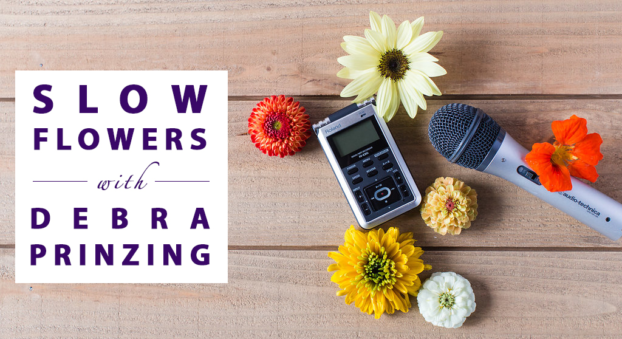
I’m so glad you joined us today! The Slow Flowers Podcast is a member-supported endeavor, downloaded more than one million times by listeners like you. Thank you for listening, commenting and sharing – it means so much. As our movement gains more supporters and more passionate participants who believe in the importance of our domestic cut flower industry, the momentum is contagious. I know you feel it, too. If you’re new to our weekly Show and our long-running Podcast, check out all of our resources at SlowFlowersSociety.com
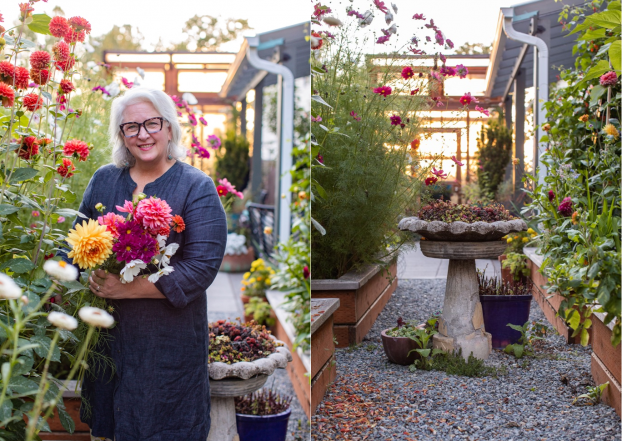
I’m Debra Prinzing, host and producer of the Slow Flowers Show & Podcast. The Slow Flowers Podcast is engineered and edited by Andrew Brenlan. The content and opinions expressed here are either mine alone or those of my guests alone, independent of any podcast sponsor or other person, company or organization. Next week, you’re invited to join me in putting more Slow Flowers on the table, one stem, one vase at a time. Thanks so much for joining us today and I’ll see you next week!
Music Credits:
Drone Pine; Gaena; Turning on the Lights; A Burst of Light
by Blue Dot Sessions
http://www.sessions.blue
Lovely
by Tryad
http://tryad.bandcamp.com/album/instrumentals
http://creativecommons.org/licenses/by-sa/3.0/
In The Field
audionautix.com










